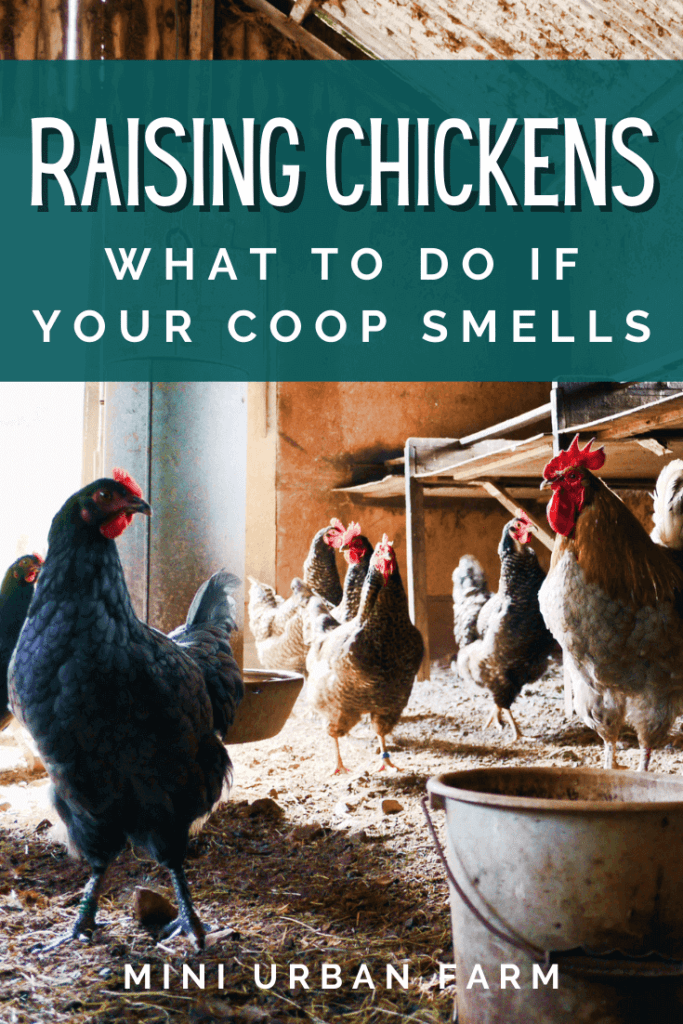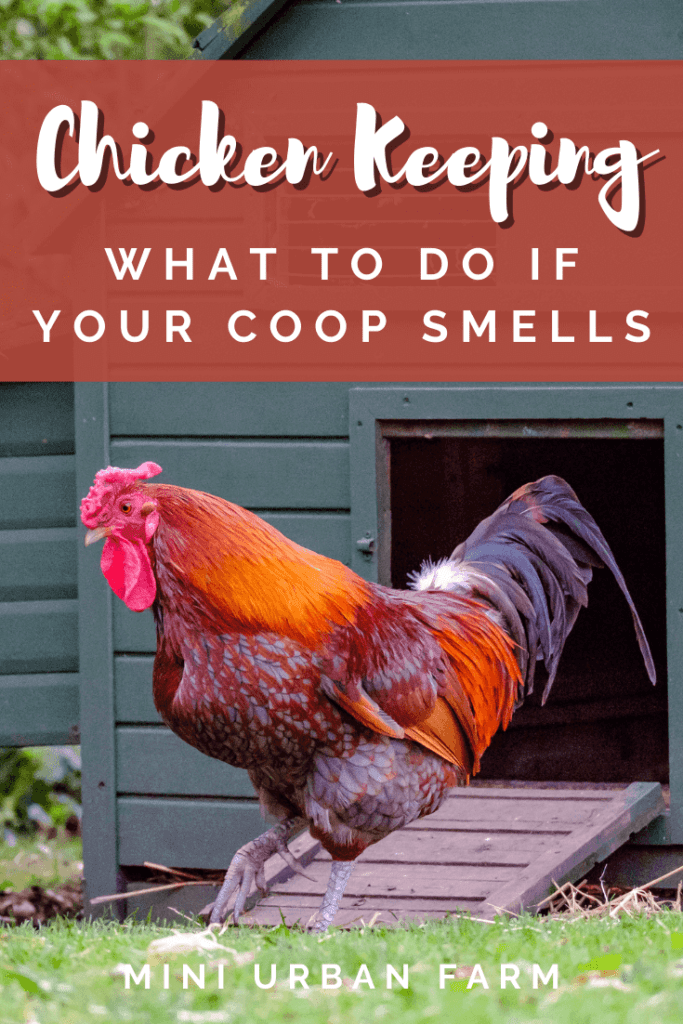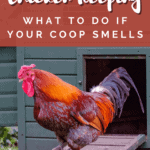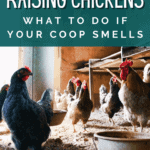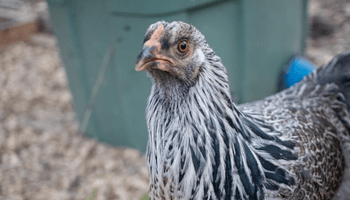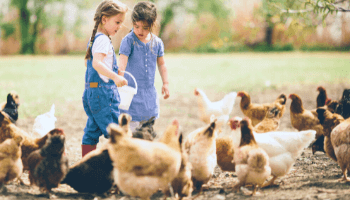Before I started raising chickens I was convinced that all farm animals had that “barnyard smell.” But one day I was at my friend’s house having coffee and we walked past her chicken coop on the way to the garden. Surprisingly there was no smell coming from the chicken coop. So I asked her…do chickens smell bad?
No, chickens do not smell bad. The foul smell you notice in chicken coops comes from the chicken feces and ammonia build up. Since the chicken feces are often confined to the coop the strength of the odour increases over time. Cleaning your coop regularly, or using the deep litter method, controls the odor and leaves your coop odorless.
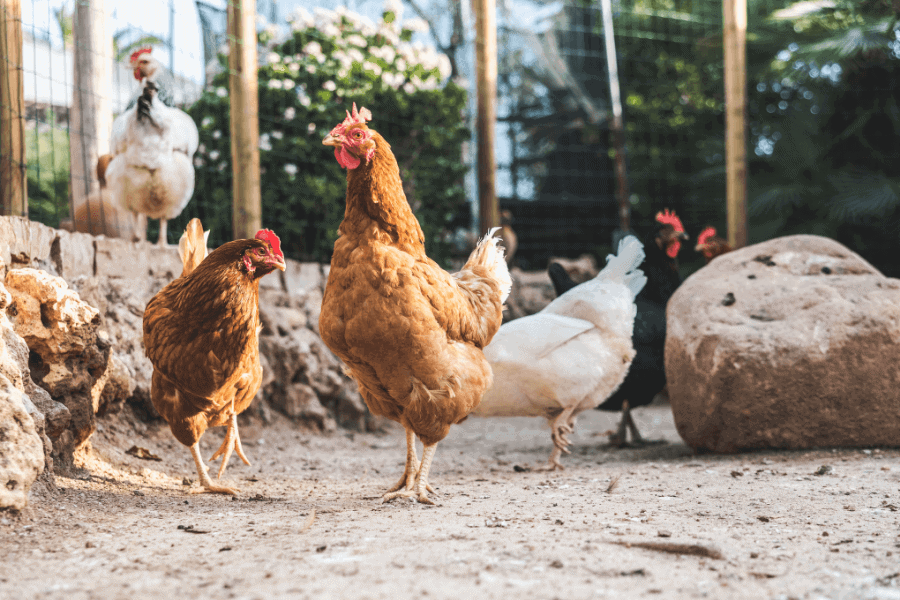
Disclosure: This post may contain affiliate links. If you purchase a product through one of our affiliate links we make a small commission from the sale at no extra cost to our readers.
Causes of Chicken Coop Smell
There are several things that would cause your chicken coop to smell – but most of them have quick fixes.
If you notice a foul odor coming from your coop, you need to take action fast since this ammonia build up can cause serious issues for the health of your flock!
Lack of Air Circulation
It is important to keep the air circulating to prevent the development of overpowering smells due to stagnant air.
There needs to be a proper ventilation system to keep the air moving – this could be as easy as having vents in the coop.
But remember to always cover any openings with hardware cloth to prevent predators from getting in!
I have 3 inches at the top of my coop that is open to fresh air – this allows air to circulate and prevents my hens from getting sick!
Moisture in the Coop
Moisture in the coop can easily spread bacteria and cause infections in your flock.
You want to avoid having any standing water in your coop, especially when it’s hot outside!
Chicken droppings combined with water will result in a pungent ammonia smell and your chickens drinking from that water is very likely to cause infections such as coccidiosis which can be deadly to your flock.
When it rains I always like to put an extra layer of pine shavings in the run to absorb extra moisture and prevent any standing water.
Lack of Bedding
Another reason why your coop might smell is a lack of bedding materials like pine shavings, sand, or straw.
If you notice a lot of accumulated droppings, you might want to consider adding more bedding to the floor of your coop, as the bedding is what soaks up watery droppings and prevents that icky smell!
A few weeks ago I walked into my coop after a heavy rain and noticed a slight ammonia smell – I quickly added in a few more fine shavings and mixed it into the existing shavings on the floor with a rake to aerate the bedding.
An hour later I went back to check, and the smell was completely gone.
Tips to Keep The Coop Smelling Fresh
- Use organic fresh herbs for chickens in and around the coop – herbs such as thyme, rosemary, and mint not only keep the coop smelling fresh, but makes for a great chicken snack also!
- Scoop out droppings weekly to prevent accumulation
- Use poultry nipples on chicken waterers to prevent spilling water in the coop
- Don’t leave extra vegetables or fruits to rot in the coop – after your birds are done eating remove any extra bits!
Deep Cleaning the Coop
I clean out the entire chicken coop at the beginning of spring and at the beginning of fall.
Not only does it help to reduce smell and bacteria build up, but it also gives me great compost for my spring and fall gardens!
I use the deep litter method in my coop which allows me to deep clean only twice per year – but if you don’t use the deep litter method then you will need to deep clean several times throughout the year.
As a new chicken keeper there were definitely some beginner mistakes that I made when figuring out how to clean the coop.
Things like how often to replace pine shavings, when to clean the coop, how to prevent infections in the chicken coop, and how to control moisture in the coop.
Weekly Coop Cleanings
The more time that your chickens remain in their coop or their run, the more frequently you will need to clean!
Heck, my hens free-range for at least 2 hours a day and I still scoop chicken droppings on a weekly basis!
However, by using the deep litter method, I can just scoop the droppings and drop them right on the floor of the run.
Over time, the chickens mix the droppings in with their bedding material and the odor is diffused.
I also add more pine shavings to their coop (only around the nesting boxes) around once per week. The run only gets more pine shavings when I deep clean.
Sanitizing the Coop
During the deep cleanings it’s always a good idea to sanitize the coop.
Once you are done cleaning all the waste it is time to hose everything down to remove all the accumulated debris.
Since your chickens are staying at the coop it is better to make use of natural disinfectants as cleaning agents to sanitise the coop and the nesting boxes.
Do not use chemical products to clean your coop as this can be too harsh for your flock and cause other health issues down the road.
A homemade vinegar and water solution is a great way to keep your coop smelling fresh and won’t break the bank.
Simply mix equal parts water and white vinegar, add to a clean spray bottle, and use it to clean any dirty areas inside the coop!
Also be sure to clean the waterer and feeders, plus mop down the inside of the coop if your have a concrete floor.
Deep Litter Method
I use the deep litter method in our chicken coop.
It’s a method that allows the chicken droppings and the bedding materials to combine and decompose inside the chicken run.
This means that you don’t have to regularly replace the bedding material in the run since it’s constantly decomposing.
About once per week I add more pine shavings to the inside of my coop, and dump the old shavings onto the floor of the run.
The good bacteria in the dirt then combine with the pine shavings, extra chicken feed, and chicken manure to create a layer of compost on the floor of the run.
This method is beneficial to the chickens as the compost consists of microbes that control harmful disease-causing pathogens.
If this method is employed properly the chickens will be dry and warm due to the decomposing process and the microbes will keep them healthy all year long.
Plus, in spring you can remove all the compost from the run and add it to your garden!
Getting Started with the Deep Litter Method
To get started with the deep litter method, you first add at least 4-6 inches of organic materials onto the floor of the coop. This can include things like pine shavings, dried leaves, straw, grass clippings, etc.
This is also known as clean litter.
Once the manure begins to accumulate and your flock mixes it all up by scratching around, you can add another thin layer of clean litter.
To ensure the litter is stirred properly you can always throw a few treats and the chickens will do the work for you.
But if you observe any damp bedding make sure to rake it through properly to control the moisture and avoid the buildup of ammonia.
You can also add in more pine shavings as needed – I always add in more shavings during summer to help control the extra rain in the run.
Over time you will see the pine shavings or other bedding materials breaking down and starting to look like sand or ash – that means your compost is on it’s way!
How do you dispose of the nesting material?
Used nesting materials from chickens can be used in the garden so long as the chicken manure has been allowed to decompose. This can be accomplished by adding the used bedding to your compost pile, or by using the deep litter method inside your coop.
Is chicken poop hazardous for grass?
Chicken droppings contain high quantities of nitrogen which can be hazardous for your grass. However, if you allow the chicken manure to decompose first then it becomes a great fertilizer for your grass and your garden!
Is insulating the chicken coop a good idea?
Chickens love to be warm and dry in the winters and cool in the summer. Insulation can be a good idea especially if you reside in an area that experiences very harsh winters. This will also help to increase egg production since hens tend to stop laying in colder weather.
Your chickens and coop should never have a bad smell. If it does then you can use this guide to figure out the root cause and remedy the situation ASAP before your flock gets sick.
A dirty coop is a hub for diseases and we don’t want that. So, maintain a safe and dry environment for your birds and you will have fewer issues to deal with in the long run!
Pin Do Chickens Smell Bad!
